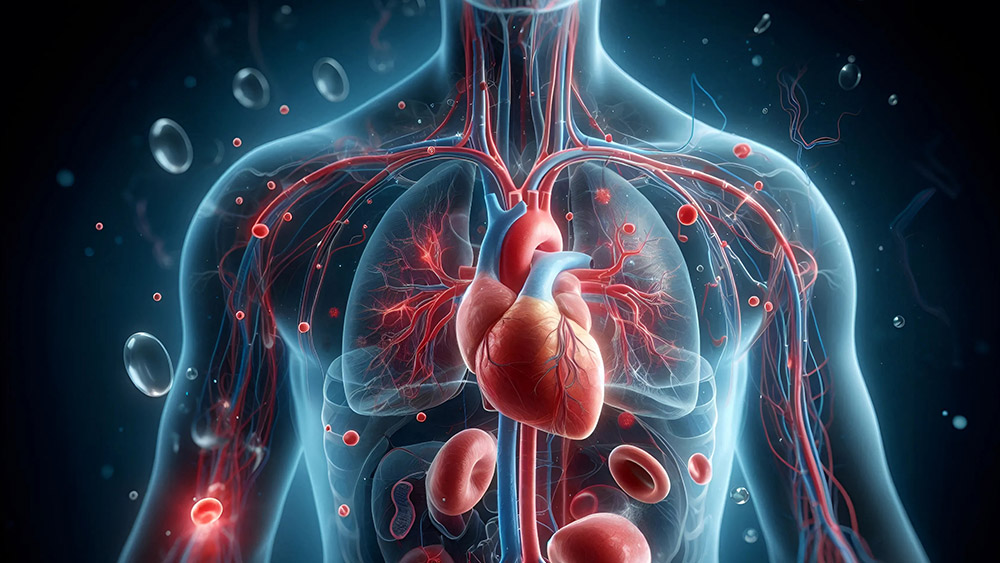 Parler
Parler Gab
Gab
- The American College of Cardiology has officially recognized chronic inflammation as a powerful, independent predictor of heart attacks and strokes, on par with cholesterol.
- The high-sensitivity C-reactive protein test is elevated to a primary tool to detect low-grade inflammation, which can irritate blood vessels and drive heart disease.
- Doctors are now urged to measure inflammation universally, as high levels can indicate significant risk even in patients with controlled cholesterol who are already on statin drugs.
- The report highlights proven medications, such as low-dose colchicine, that can significantly reduce cardiovascular events by directly targeting inflammation.
- The ACC strongly emphasizes a Mediterranean-style diet, regular exercise, quitting smoking, and maintaining a healthy weight as foundational strategies to lower inflammation and reduce heart disease risk.
A new clinical standard
The report states that because doctors will not treat what they do not measure, universal screening of hsCRP is now recommended for patients both with and without known heart disease. The statement asserts that in patients with established cardiovascular disease, a high hsCRP level is at least as predictive of a future heart attack or stroke as a high LDL cholesterol level. This holds even for patients already taking statin drugs, indicating that controlling cholesterol alone does not always extinguish the inflammatory risk. This represents a monumental shift in clinical strategy. It moves inflammation from a secondary concern to a central biomarker, on par with the traditional cholesterol panel. The implications are vast, suggesting that millions of patients currently deemed "managed" on statin therapy may still harbor significant residual risk if their inflammation remains unchecked. The report insists that a persistently high hsCRP reading should lead doctors to consider starting or intensifying statin therapy, regardless of what the patient's LDL cholesterol number shows.Lifestyle as medicine
Perhaps the most empowering part of the new recommendations is its strong emphasis on lifestyle as a primary anti-inflammatory strategy. The ACC provides clear, actionable guidance for individuals found to have high inflammatory markers. The recommended diet mirrors the Mediterranean pattern, emphasizing the consumption of fruits, vegetables, whole grains, legumes, nuts and olive oil, while minimizing red and processed meats, refined carbohydrates and sugary beverages. The report specifically advocates for increasing the intake of omega-3 fatty acids, found in fatty fish, which the body can use to produce specialized molecules that actively resolve inflammation. This dietary advice is coupled with the standard but crucial recommendations for regular exercise—at least 150 minutes per week—quitting smoking, and maintaining a healthy weight. "Lifestyle choices directly influence the primary mechanisms that lead to heart disease," said Brighteon.AI's Enoch. "An unhealthy diet, physical inactivity and chronic stress can cause high blood pressure, high cholesterol and inflammation, which damage the arteries. Conversely, positive habits like regular exercise and a balanced diet help protect the heart by maintaining healthy blood vessels and reducing these risk factors." Historically, the fight against heart disease has evolved through several eras. First was the recognition of hypertension as a killer. Then came the cholesterol hypothesis, which dominated for the latter part of the 20th century. The ACC's statement heralds a third era: the inflammation era. This is not to discard the importance of cholesterol but to augment it, creating a more complete and accurate picture of an individual's cardiovascular health. This new guidance from one of the world's most respected cardiology organizations fundamentally redefines the early detection and prevention of heart disease. By mandating the measurement of inflammation, it empowers physicians to identify at-risk patients earlier and provides individuals with a new, modifiable pathway to heart health. It confirms that the silent, smoldering fire within is a critical threat, but one that can now be seen, measured and extinguished. Watch and learn about ways and medicine to care for your heart. This video is from the BrightLearn channel on Brighteon.com. Sources include: TheEpochTimes.com ACC.org News-Medical.net Brighteon.ai Brighteon.comIndia resumes diplomatic ties with Afghanistan, reopens embassy in Kabul
By Ramon Tomey // Share
By Finn Heartley // Share
By Finn Heartley // Share
Alarming health trends expose gaps in prevention, detection and public trust
By Patrick Lewis // Share
Why growing your own garlic could be the simplest health investment you make
By Cassie B. // Share
Governments continue to obscure COVID-19 vaccine data amid rising concerns over excess deaths
By patricklewis // Share
Tech giant Microsoft backs EXTINCTION with its support of carbon capture programs
By ramontomeydw // Share
Germany to resume arms exports to Israel despite repeated ceasefire violations
By isabelle // Share










